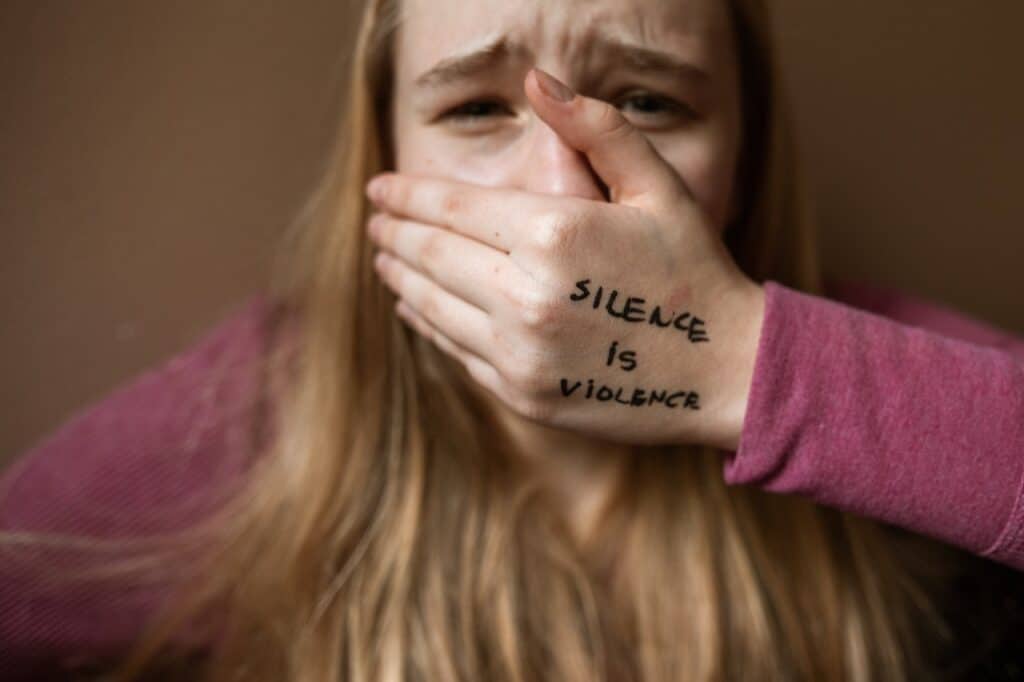
Introduction
Mental abuse can be a silent and insidious form of violence in relationships. Understanding its signs, impact, and coping strategies can be essential for both victims and their support system. In this article, we’ll explore mental abuse in relationships and empower you with knowledge and resources to break free from abusive situations.
Table of Contents
What is Mental Abuse?
This section helps readers recognize the subtle and overt signs of mental abuse in relationships, including manipulation, gaslighting, and control tactics. It aims to raise awareness about the various forms mental abuse can take, helping victims identify and address their situations.
Defining Mental Abuse
Mental abuse, also known as emotional or psychological abuse, is a pattern of behavior that involves manipulating, controlling, or belittling another person to gain power and control. It can take many forms and often goes unrecognized, even by the victim.
Different Types of Mental Abuse
Mental abuse can manifest in various ways, including:
- verbal aggression,
- manipulation,
- humiliation,
- isolation,
- gaslighting
Each type can have a severe impact on the victim’s mental health and well-being.
Signs of Mental Abuse in Relationships
Mental abuse in relationships can be subtle and challenging to recognize, but it’s crucial to understand the warning signs to protect oneself and seek help. Here are some common signs of mental abuse in relationships:
Constant Criticism and Belittling:
An abusive partner often criticizes and belittles their partner regularly, making them feel worthless and inadequate. This may include attacks on their appearance, intelligence, or abilities. Over time, constant criticism erodes the victim’s self-esteem and confidence.
Gaslighting:
Gaslighting is a manipulative tactic where the abuser makes their partner question their reality and sanity. They may deny events that happened, dismiss their partner’s feelings, or accuse them of being overly sensitive, causing confusion and self-doubt.
Isolation:
Abusers may try to isolate their partner from friends and family, making them dependent on the abuser for social interactions. This may involve controlling who they can see, where they can go, and even what they can wear, resulting in increased vulnerability and dependence on the abuser.
Control:
Mental abusers often exert control over their partner’s life, dictating their decisions and actions. This may include monitoring their phone or social media, demanding access to their passwords, or controlling their finances.
Emotional Blackmail:
Abusers may use emotional blackmail to manipulate their partner’s feelings and actions. They may threaten to harm themselves, spread rumors, or use guilt to coerce their partner into doing what they want.
Stonewalling:
An abusive partner may stonewall, or refuse to communicate, when their partner attempts to discuss issues or express their feelings. This can leave the victim feeling unheard, dismissed, and powerless.
Blame Shifting:
Abusers often shift the blame for their behavior onto their partner, accusing them of being the cause of the problem or provoking the abuse. This tactic undermines the victim’s self-esteem and reinforces the belief that they deserve the abuse.
Withholding Affection:
An abusive partner may use affection as a tool to control their partner, withholding love and attention as a form of punishment or manipulation. This can leave the victim feeling unworthy and desperate for their partner’s approval.
By understanding these signs of mental abuse in relationships, individuals can identify abusive behaviors, protect themselves, and seek support from friends, family, or professionals.
Real Life Examples of Mental Abuse
You might be experiencing emotional abuse if your partner:
- Frequently belittles you, uses name-calling, or constantly criticizes your actions
- Displays excessive jealousy or possessiveness, questioning your loyalty and trustworthiness
- Always insists on being right while undermining your opinions and making you doubt your own judgment
- Alienates you from your friends and family, often attempting to control your social interactions
- Takes charge of your friendships and decides whom you can associate with
- Keeps track of your whereabouts, phone calls, and activities, often without your consent
- Discourages or prevents you from working or pursuing a career
- Controls your finances, denies access to financial information, or restricts your access to money
- Punishes you by withholding affection or using the “silent treatment” as a means of control
- Expects you to ask for permission before making any decisions, including how you spend money or allocate your time
- Threatens to harm you, your children, relatives, or even pets as a form of intimidation
- Publicly humiliates or embarrasses you, leaving you feeling demeaned and isolated
If you recognize these signs in your relationship, it’s essential to acknowledge that you may be experiencing emotional abuse. This form of abuse can be damaging and have long-lasting effects on your mental health and well-being. Reach out for support and resources to help you navigate this challenging situation.
The Impact of Mental Abuse on Victims
Mental abuse can have severe and long-lasting effects on victims, impacting various aspects of their life. Here are some of the ways mental abuse affects victims:
Low self-esteem:
Constant criticism, belittling, and blame shifting can wear down a victim’s self-esteem, making them feel worthless and inadequate. This erosion of self-worth can lead to a cycle of self-blame and feelings of failure, making it difficult for the victim to recognize the abuse and seek help.
Depression and anxiety:
The ongoing stress and emotional turmoil of mental abuse can lead to the development of depression and anxiety disorders. Victims may experience constant feelings of sadness, hopelessness, and worry, affecting their ability to function in daily life.
Isolation:
Mental abusers often isolate their victims from friends and family, leaving them without a support network. This isolation can increase feelings of loneliness and make it harder for victims to leave the abusive relationship.
Physical health problems:
The chronic stress associated with mental abuse can lead to physical health issues, including headaches, digestive problems, and sleep disturbances. Additionally, the impact of mental abuse on mental health can lead to unhealthy coping mechanisms such as substance abuse or disordered eating, further affecting physical health.
Impaired decision-making:
Victims of mental abuse may struggle with decision-making, as they are frequently undermined and controlled by their abuser. This can lead to feelings of helplessness and a lack of autonomy, making it difficult for victims to recognize and act upon their best interests.
Trauma:
The ongoing psychological manipulation and emotional harm associated with mental abuse can lead to trauma. Victims may develop symptoms of post-traumatic stress disorder (PTSD), including flashbacks, nightmares, and hypervigilance, long after the abuse has ended.
Difficulty trusting others:
The betrayal of trust inherent in mental abuse can make it challenging for victims to trust others, even after leaving the abusive relationship. This can impact future relationships and make it difficult for victims to form healthy, trusting connections with others.

Why Victims Stay in Abusive Relationships
There are several reasons why victims may stay in abusive relationships, making it difficult for them to break free. Some of these reasons include:
Fear:
Victims may fear the consequences of leaving, such as the abuser becoming more violent or retaliating in other ways. They may also fear losing their children, financial security, or social status.
Low self-esteem:
As mentioned earlier, mental abuse can erode a victim’s self-esteem, making them feel worthless and undeserving of a better life. This self-doubt can make it difficult for victims to believe they can survive and thrive outside the abusive relationship.
Love and attachment:
Victims may still love their abuser, despite the harm they cause. They may believe that their partner will change or that the abuse is a temporary issue that can be resolved. The cycle of abuse, often characterized by periods of calm and affection, can reinforce this belief.
Financial dependence:
Many victims may be financially dependent on their abuser, making it challenging to leave the relationship without the means to support themselves and their children.
Shame and embarrassment:
Victims may feel ashamed of their situation or fear being judged by others if they disclose the abuse. This shame can keep them silent and unwilling to seek help.
Social and cultural pressures:
In some cases, societal or cultural norms may pressure victims to stay in abusive relationships. They may face stigma, criticism, or ostracization if they choose to leave.
Lack of support:
Victims may not have a supportive network of friends or family to help them leave the abusive relationship
Victims may still love their abusers and believe that the abuse is a sign of love or a temporary problem that will eventually be resolved.
Strategies for Coping with Mental Abuse
Coping with mental abuse can be incredibly challenging, but it’s important to remember that you deserve to be treated with respect and kindness. Here are some strategies to help you cope with mental abuse:
1. Recognize the abuse
The first step in coping with mental abuse is recognizing that it is happening. This can be difficult, as abusers often manipulate and gaslight their victims, making them question their own perceptions and experiences. Pay attention to patterns of behavior and trust your instincts when something feels wrong.
2. Develop a support network
Having a support network of friends, family, and professionals can provide you with the emotional strength and resources needed to cope with mental abuse. Reach out to people who understand your situation and can offer guidance and encouragement.
3. Seek professional help
A mental health professional, such as a therapist or counselor, can provide valuable support and guidance in coping with mental abuse. They can help you develop coping strategies, work on building self-esteem, and explore options for leaving the abusive relationship if you choose to do so.
4. Set boundaries
Setting boundaries can help protect your emotional well-being in the face of mental abuse. Be assertive in communicating your needs and limits, and try to distance yourself from the abusive behavior as much as possible.
5. Practice self-care
Caring for yourself is essential when coping with mental abuse. Prioritize activities that help you feel relaxed and rejuvenated, such as exercise, meditation, or spending time with loved ones. Maintain a healthy diet, get enough sleep, and seek medical care when needed.
6. Develop healthy coping mechanisms
It’s essential to find healthy ways to cope with the stress and emotions associated with mental abuse. Avoid turning to unhealthy coping mechanisms, such as substance abuse or self-harm. Instead, focus on activities that help you manage your emotions and build resilience, such as journaling, deep breathing exercises, or engaging in hobbies that bring you joy.
7. Educate yourself
Learning about mental abuse, its effects, and strategies for coping can empower you and help you better understand your situation. Read books, articles, and attend support groups or workshops focused on mental abuse and recovery.
Leaving an Abusive Relationship
Leaving an abusive relationship can be an incredibly difficult and emotional decision. However, it’s important to prioritize your safety and well-being. Here are some steps to help you leave an abusive relationship:
1. Develop a safety plan
A safety plan is a personalized, practical plan that outlines the steps you can take to stay safe while in an abusive relationship or when preparing to leave one. Consider factors such as where you will go, how you will get there, and what you will need to bring with you.
2. Seek support
Leaving an abusive relationship can be an isolating experience. Reach out to friends, family, or professional organizations for support and assistance in leaving the relationship.
3. Gather important documents and belongings
Prepare for your departure by gathering essential documents (such as identification, financial records, and legal documents) and personal belongings. Store them in a safe place, such as with a trusted friend or in a secure location outside the home.
4. Plan for financial independence
Financial dependence on an abuser can make leaving the relationship more challenging. Begin to establish financial independence by opening a separate bank account, securing employment, or accessing financial assistance programs.
5. Obtain a restraining order if necessary
If you fear for your safety or the safety of your children, consider obtaining a restraining order against your abuser. This can provide legal protection and help ensure your safety during the process of leaving the relationship.
6. Seek legal assistance
Navigating the legal aspects of leaving an abusive relationship can be complex and overwhelming. Seek legal assistance from an attorney or legal aid organization to help you understand your rights and navigate issues such as child custody, divorce, and property division.
7. Prioritize self-care and healing
Leaving an abusive relationship is an emotionally intense and challenging experience. Prioritize your well-being by practicing self-care and focusing on your healing process. Seek therapy or counseling to help you process your emotions, develop coping strategies, and rebuild your self-esteem.
8. Establish a support network
Rebuilding your life after leaving an abusive relationship can be a challenging process. Establish a support network of friends, family, and professionals who can offer guidance, encouragement, and assistance as you transition into your new life.
9. Be patient with yourself
Healing from the trauma of an abusive relationship takes time and patience. It’s essential to give yourself permission to feel a range of emotions and recognize that recovery is a gradual process. Be patient with yourself and take each day one step at a time.
10. Join a support group
Connecting with others who have experienced abusive relationships can provide a sense of community and understanding. Consider joining a support group, either in-person or online, to share your experiences, learn from others, and find comfort in knowing you are not alone.
Leaving an abusive relationship can be one of the most challenging and courageous decisions you make. While the process may be difficult and emotionally taxing, prioritizing your safety, well-being, and healing is the first step toward a brighter, healthier future. Remember that you are not alone, and there are resources and people available to help and support you along the way.
The Role of Friends and Family in Supporting Victims
Friends and family play a vital role in supporting victims of mental abuse. This section covers the importance of listening, empathy, emotional and practical support, and encouraging professional help in helping victims heal and recover.
Listening and Empathy
Providing a safe space for the victim to share their experiences and feelings without judgment can be invaluable to their healing process.
Offering Emotional and Practical Support
Offering emotional support and practical help, like finding a safe place to stay or connecting them with resources, can make a significant difference for the victim.
Encouraging Professional Help
Encouraging the victim to seek professional help, such as therapy or counseling, can help them understand and process their experiences and develop coping strategies.
Help 24/7 line for Emotional Abuse.
FAQ
What are the signs of mental abuse in a relationship?
Signs of mental abuse in a relationship may include manipulation, humiliation, isolation, threats, guilt trips, and gaslighting.
Why do victims stay in abusive relationships?
Victims may stay in abusive relationships due to fear, love and emotional dependence, low self-esteem, or financial dependence.
How can I support a friend or family member who is experiencing mental abuse?
Listening empathetically, offering emotional and practical support, and encouraging professional help are crucial ways to support a friend or family member experiencing mental abuse.
How can a victim of mental abuse cope with the effects of the abuse?
Building a support system, seeking professional help, establishing boundaries, and developing healthy coping mechanisms can help victims cope with the effects of mental abuse.
What should a victim consider when leaving an abusive relationship?
A victim should consider safety planning, legal options and resources, and seeking support from organizations when leaving an abusive relationship.





